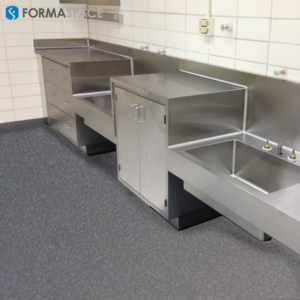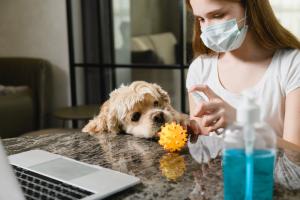Protecting You and Your Pets from COVID

Formaspace can build custom laboratory and surgical stations for veterinarian offices and pet hospitals. The installation above is made from heavy-duty stainless steel for easy cleaning and sterilization.
Find out which pets could be at risk of Covid-19 infection and how you can protect your family members, including your dogs, cats, birds, and other pets.
Scientific research says dogs can get Covid from Covid-positive owners – but so far, this seems to be an uncommon occurrence or, more accurately speaking, there are very few documented cases to date.”
AUSTIN, TEXAS, UNITED STATES, January 6, 2021 /EINPresswire.com/ -- The coronavirus pandemic upended our lives throughout 2020, with many of us spending significantly more time at home. As a result, during this year of isolation, many of us turn to our “fur babies” for emotional companionship and stress reduction.— Formaspace
Indeed, the unexpected cameo appearances of cats and dogs walking into live video shots over the past year livened up many otherwise mundane Zoom conference calls or television news programs broadcast live from a reporter’s bedroom.
Perhaps unsurprisingly – given the recent shortages of toilet paper, baking flour, and other household items – there were even spot shortages of cats and dogs available for adoption during 2020, with some perspective pet owners bidding up the price of purebred puppies and kittens to record heights. (FWIW, we recommend adopting from your local shelter if you can.)
Assessing The Risk Of Covid With Pets In The Household
Whether you are a longtime pet owner or have recently adopted a Christmas puppy or a New Year kitten, you may be wondering about health and safety issues vis-à-vis pets and the Coronavirus.
Important questions to ask include:
- Can I give Covid to my pet?
- Can my pet get Covid?
- Could my pet transmit Covid to me?
All these questions are based on very reasonable concerns – given that SARS-CoV-2 (as Covid-19 is formally known) is a disease of zoonotic origin (meaning the virus has crossed between species) that most likely originated in bats and from there possibly passed onto pangolins before transferring to humans.
Another reason for concern is we treat our pets like family; it’s not uncommon for kids and adults alike to stroke a cat’s fur as it sits in our lap, or to let a pet dog lick our face, or allow them to sleep in the family bed at night.
But the recent culling of millions of mink raised for the fur trade in Denmark (suspected of harboring a potentially dangerous new variant of Covid-19) is a wake-up call for us to revisit whether close contact with our pets is safe and how we can protect ourselves (and them!) from transferring the virus.
What We Know About Covid Transmission On Surfaces
During the spring of 2020, when coronavirus cases first began to surge, there was an understandably high level of anxiety about keeping all touchable surfaces clean to prevent transferring the virus from one person to another.
Since that time, we’ve come to understand that while the virus can live on surfaces for many hours (or even several days), transferring the virus via contaminated surfaces (known as fomite transmission) is generally less risky than breathing in aerosol droplets that are expelled from another person’s respiratory tract – e.g. when they breathe, speak, sing, cough, or sneeze.
And scientists now believe that frequently washing or sanitizing your hands before eating (and training yourself to avoid touching your face with your hands) can reduce fomite transmission of the virus to a great degree.
But what about the respiratory aerosols expelled by people? In still air, these particles tend to fall to the floor (or to the ground if you’re outside).
For most adults, virus particles on the floor aren’t that risky – and you can change shoes or remove them before entering your home. But what about small pets, like poor Fido, who spend much of their time on the floor? Are they at greater risk?
The answer depends on the species of pet.
Can My Dog Get Covid?
As mentioned earlier, many of us kiss our pups, let them lick on us, brush and pet their fur, and often, we let them sleep in our beds.
So it’s important to ask the question: can dogs get Covid?
Scientific research says yes – dogs can get Covid from Covid-positive owners – but so far, this seems to be an uncommon occurrence – or, more accurately speaking, there are very few documented cases to date.
In the first reported case, a Covid-positive Hong Kong resident had their Pomeranian dog tested (via an RT-PCR test), and the dog was found to have a Covid infection as well.
Subsequently, a second case emerged in Hong Kong where the pet owner was Covid-positive, and their dog, a German Shepherd, also subsequently tested positive with Covid. Despite the infection, the dog did not pass the virus to another dog sharing the same kennel, nor did it exhibit any Covid disease-related symptoms, such as respiratory distress.
Admittedly, this is a small sample, but scientists in Hong Kong believe this indicates that, while human-to-dog transmission is possible, there is no evidence that dogs can suffer from Covid symptoms themselves or pass the virus on to other dogs or humans.
Researchers in Spain disagree with these assumptions. They performed statistical analysis on over 2,000 individuals and found evidence that dogs and their owners could be at an increased risk of Covid transmission. Researchers found that having a dog in the household (and taking it for walks) was associated with up to 78% higher risk of contracting Coronavirus compared to households without a dog or dog walking activities.
The reason for this marked discrepancy between households remains unclear. Researchers speculate that dogs may be contributing to viral spread due to unhygienic behaviors during walks in public areas, and they note “we should not rule out the possibility that the virus may be transmitted via fecal matter.” Meanwhile, a separate trio of researchers speculated that dogs, which share the same ACE-2 receptor mechanism that the virus latches onto as humans, may have helped spread the virus during the worst of the early outbreak in northern Italy.
More research is needed.
Until then, the resulting uncertainty poses a dilemma for dog owners. Walking a dog is good for exercise and helps improve mental well-being – for the dog and owner alike.
If fomite transmission is to blame for the statistical increase in positivity rates, then dog owners should take care to wear a mask when dog walking, stay 6 feet or more away from others, avoid areas where people and their pets have been congregating (such as cafes or dog parks), walk on surfaces that cut the lifespan of the virus short (such as concrete or wet grass), as well as avoiding you or your dog contacting other dog’s fecal matter (while at the same time bagging up and safely disposing of your own pet’s waste).
Good hygiene is important. Wash your hands after touching your dog. And if you or a family member becomes infected with Covid, take the same precautions to prevent your pet from getting infected as you would with any other family member.
Read more...
Julia Solodovnikova
Formaspace
+1 800-251-1505
email us here
Visit us on social media:
Facebook
Twitter
LinkedIn



